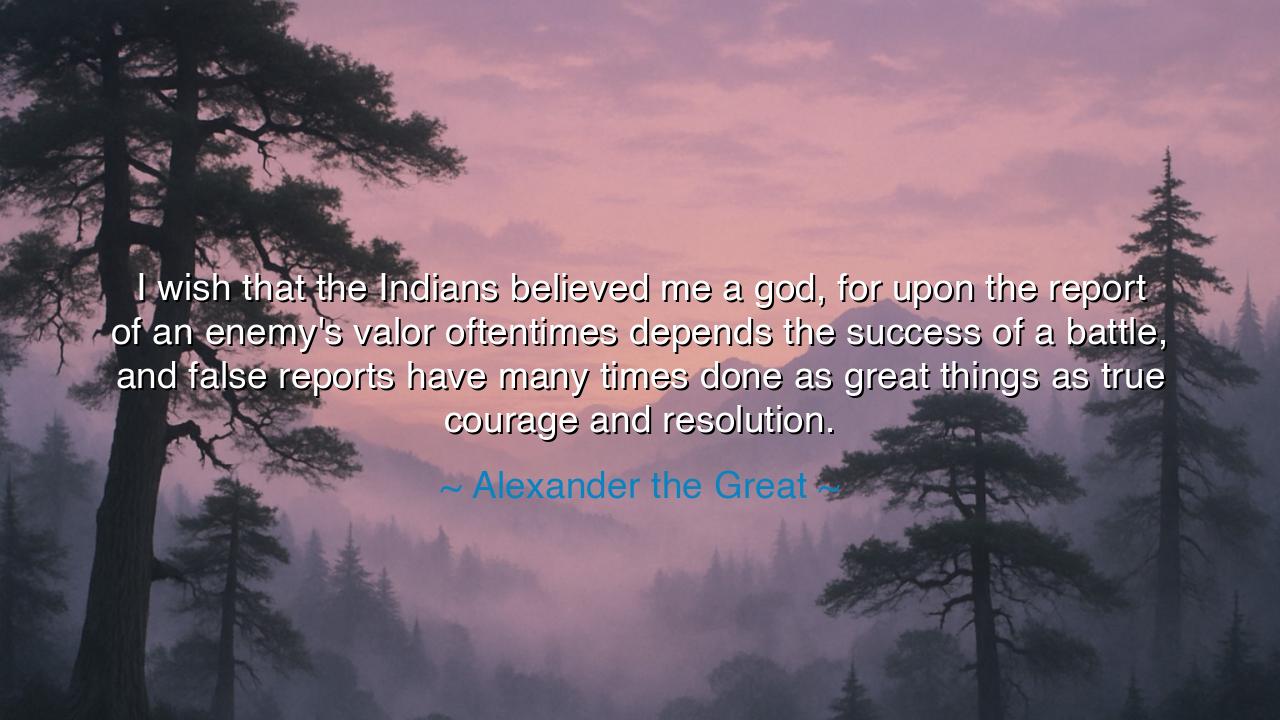
I wish that the Indians believed me a god, for upon the report of
I wish that the Indians believed me a god, for upon the report of an enemy's valor oftentimes depends the success of a battle, and false reports have many times done as great things as true courage and resolution.






"I wish that the Indians believed me a god, for upon the report of an enemy's valor oftentimes depends the success of a battle, and false reports have many times done as great things as true courage and resolution." Thus spoke Alexander the Great, the mighty conqueror whose name thundered across continents and whose shadow stretched beyond empires. In this declaration, he unveils a truth not merely of war, but of human nature itself—that the power of perception can rival the power of steel, and that belief, whether born of truth or illusion, can shape the course of destiny.
Alexander’s words were born in the midst of his campaign through India, where his legions, exhausted by endless conquest, faced unfamiliar terrain and indomitable foes. He understood that battles are not won solely by the sword, but by the mind—that courage, fear, and belief are as decisive as tactics or numbers. “If they believed me a god,” he said, not from vanity, but from strategy. For he knew that the idea of invincibility could weaken his enemies before the first clash of arms. In this, Alexander revealed his genius—not only as a warrior, but as a master of the human spirit.
To the ancients, war was as much a contest of hearts as of weapons. Valor and reputation were forces as tangible as shields and spears. When soldiers believed their leader to be divine, their courage became unbreakable; when they thought their enemy invincible, their hearts faltered. Alexander, who had studied the legends of Achilles and the teachings of Aristotle, grasped this truth more deeply than any of his age. He wove it into his very identity—marching not as a mere man, but as a myth in motion. Thus, even before he reached a battlefield, rumor and awe rode before him like heralds of victory.
History offers countless examples of this unseen weapon—the power of belief. Consider the Roman general Julius Caesar, who during the civil wars, spread word that the gods favored his legions. His enemies, hearing tales of his unbroken victories, lost faith before the battle began. Or the great Genghis Khan, whose enemies whispered that he was sent by the heavens, a punishment upon the earth. Their fear became prophecy, and their disbelief became their downfall. In every age, the imagination of men has proven mightier than their arms. For courage and terror are twins, born of the same mother—perception.
Yet Alexander’s insight carries not only a lesson in war, but in life. It teaches that belief shapes reality. Just as false reports can inspire courage or cause despair, so too can the stories we tell ourselves determine our fate. A man who believes himself powerless becomes so; a man who believes himself capable moves mountains. Alexander’s genius was to understand that the mind must be conquered before the body can follow. The same truth governs every struggle—whether in battle, in leadership, or in the silent wars within the soul.
There is also a shadowed wisdom in his words. For though false reports can create courage, they can also deceive. Illusions may bring victory for a time, but truth alone sustains greatness. Alexander’s own legend, though divine in its scope, could not shield him from the frailty of mortality. The man who wished to be a god died as a man. Yet even in this, his insight endures: perception shapes the world, but wisdom lies in knowing its limits. The greatest leaders use belief not to deceive, but to inspire—to awaken courage, not delusion, in their followers.
So, my children of tomorrow, heed this lesson from the Macedonian conqueror. Understand that belief is the seed of both victory and defeat. Guard what you allow yourself to believe, for your mind is the first battlefield. Let courage, not fear, be the rumor that precedes you. Let your valor be real, not false, and let your confidence rest not on illusion, but on the strength of your heart. For while false reports may win a moment, it is true courage and resolution that endure beyond the ages.
Thus, remember the wisdom of Alexander the Great: that men and nations are moved as much by imagination as by power, and that the one who masters belief—both his own and that of others—masters the tides of destiny itself. But let that mastery be bound by truth and honor, for the noblest victories are not those won by fear, but by faith, vision, and the steadfast courage to meet the world as it is, and still rise above it.






AAdministratorAdministrator
Welcome, honored guests. Please leave a comment, we will respond soon